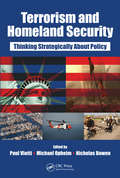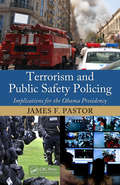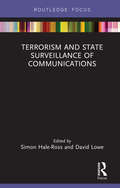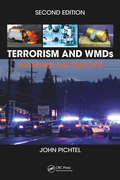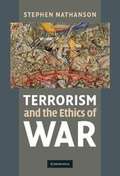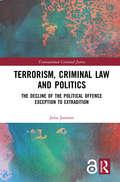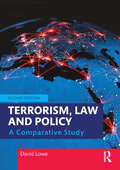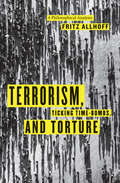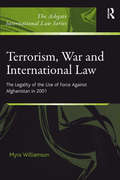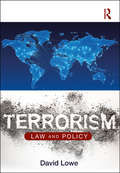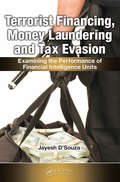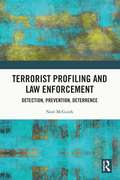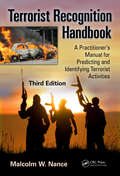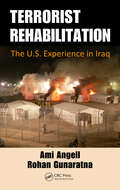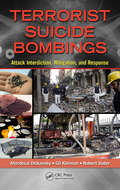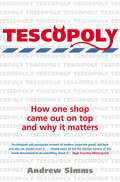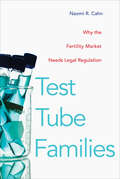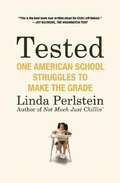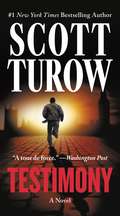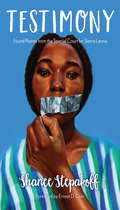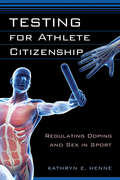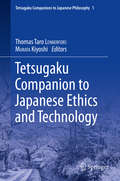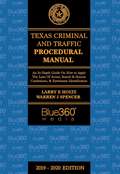- Table View
- List View
Terrorism and Homeland Security: Thinking Strategically About Policy
by Paul R. Viotti Nicholas Bowen Michael A. OpheimDespite the fact that the Department of Homeland Security (DHS) has been active since November of 2002, the American homeland is still not secure from terrorist attack. What passes as DHS strategy is often just a list of objectives with vague references to the garnering of national resources, and the marshalling of support from other nations. Drawi
Terrorism and Public Safety Policing: Implications for the Obama Presidency
by James F. PastorThe trends, data, and battle-tested logic don't lie. A perfect storm of extremist ideologies is on the horizon that threatens to challenge the current state of public safety forcing police chiefs, public administrators, and security professionals to rethink their approach to policing the streets of America. Professor James Pastor, a recognized auth
Terrorism and State Surveillance of Communications
by David Lowe Simon Hale-RossThis book brings together leading counterterrorism experts, from academia and practice, to form an interdisciplinary assessment of the terrorist threat facing the United Kingdom and the European Union, focusing on how terrorists and terrorist organisations communicate in the digital age. Perspectives drawn from criminological, legalistic, and political sciences, allow the book to highlight the problems faced by the state and law enforcement agencies in monitoring, accessing, and gathering intelligence from the terrorist use of electronic communications, and how such powers are used proportionately and balanced with human rights law. The book will be a valuable resource for scholars and students of terrorism and security, policing and human rights. With contributions from the fields of both academia and practice, it will also be of interest to professionals and practitioners working in the areas of criminal law, human rights and terrorism.
Terrorism and WMDs: Awareness and Response, Second Edition
by John PichtelTerrorism and WMD’s, Second Edition provides a comprehensive, up-to-date survey of terrorism and weapons of mass destruction (WMDs). Terrorist weapons and delivery methods are becoming increasingly sophisticated; as such, this book focuses on the chemistry and biology of WMDs, the development and history of their use, and human health effects of such weapons. Coverage of new threats, additional case studies, and the emergence of ISIL—and other terrorist actors—have been added to the new edition which will serve as an invaluable resources to students and professionals studying and working in the fields of terrorism, Homeland Security, and emergency response.
Terrorism and the Ethics of War
by Stephen NathansonMost people strongly condemn terrorism; yet they often fail to say how terrorist acts differ from other acts of violence such as the killing of civilians in war. Stephen Nathanson argues that we cannot have morally credible views about terrorism if we focus on terrorism alone and neglect broader issues about the ethics of war. His book challenges influential views on the ethics of war, including the realist view that morality does not apply to war, and Michael Walzer's defence of attacks on civilians in 'supreme emergency' circumstances. It provides a clear definition of terrorism, an analysis of what makes terrorism morally wrong, and a rule-utilitarian defence of noncombatant immunity, as well as discussions of the Allied bombings of cities in World War II, collateral damage, and the clash between rights theories and utilitarianism. It will interest a wide range of readers in philosophy, political theory, international relations, and law.
Terrorism and the Right to Resist
by Christopher J. FinlayThe words 'rebellion' and 'revolution' have gained renewed prominence in the vocabulary of world politics and so has the question of justifiable armed 'resistance'. In this book Christopher J. Finlay extends just war theory to provide a rigorous and systematic account of the right to resist oppression and of the forms of armed force it can justify. He specifies the circumstances in which rebels have the right to claim recognition as legitimate actors in revolutionary wars against domestic tyranny and injustice and wars of liberation against wrongful foreign occupation and colonialism. Arguing that violence is permissible only in a narrow range of cases, Finlay shows that the rules of engagement vary during and between different conflicts and explores the potential for irregular tactics to become justifiable, such as non-uniformed guerrillas and civilian disguise, the assassination of political leaders and regime officials, and the waging of terrorist war against civilian targets.
Terrorism, Criminal Law and Politics: The Decline of the Political Offence Exception to Extradition (Transnational Criminal Justice)
by Julia JanssonRecent atrocities have ensured that terrorism and how to deal with terrorists legally and politically has been the subject of much discussion and debate on the international stage. This book presents a study of changes in the legal treatment of those perpetrating crimes of a political character over several decades. It most centrally deals with the political offence exception and how it has changed. The book looks at this change from an international perspective with a particular focus on the United States. Interdisciplinary in approach, it examines the fields of terrorism and political crime from legal, political science and criminological perspectives. It will be of interest to a broad range of academics and researchers, as well as to policymakers involved in creating new anti-terrorist policies.
Terrorism, Law and Policy: A Comparative Study
by David LoweTerrorism, Law and Policy: A Comparative Study is a textbook offering a comparative study of the terrorism-related legislation, policy and practice introduced from international governmental bodies such as the UN and the European Union, and individual states, with a focus on Australia, Canada, New Zealand, the UK and the US. It offers a uniquely legal perspective on key themes relating to terrorism and security. This new edition is brought fully up to date with the ever-changing developments in terrorist activity, as well as in states’ approaches to anti-terrorism legislation and policy. It includes new chapters on the far-right and extreme far-right cause, one on offering a comparative study of the anti-terrorism policies of states and international bodies, and the role of international and national counter-terrorism agencies, planning and preparing acts of terrorism and a new chapter on freedom of expression, hate crime and proscribing groups as terrorist organisations. Terrorism, Law and Policy: A Comparative Study is ideally suited for terrorism and security modules at undergraduate and postgraduate levels, and will also be of interest to practitioners working on the legal aspects of these areas.
Terrorism, Ticking Time-Bombs, and Torture: A Philosophical Analysis
by Fritz AllhoffA provocative philosophical investigation into the ethics of torture, The War on Terror, and making tough choices in exceptional circumstances. The general consensus among philosophers is that the use of torture is never justified. In Terrorism, Ticking Time-Bombs, and Torture, Fritz Allhoff demonstrates the weakness of the case against torture; while allowing that torture constitutes a moral wrong, he nevertheless argues that, in exceptional cases, it represents the lesser of two evils. Allhoff does not take this position lightly. He begins by examining the way terrorism challenges traditional norms, discussing the morality of various practices of torture, and critically exploring the infamous ticking time-bomb scenario. After carefully considering these issues from a purely philosophical perspective, he turns to the empirical ramifications of his arguments, addressing criticisms of torture and analyzing the impact its adoption could have on democracy, institutional structures, and foreign policy. The crucial questions of how to justly authorize torture and how to set limits on its use make up the final section of this timely, provocative, and carefully argued book.
Terrorism, War and International Law: The Legality of the Use of Force Against Afghanistan in 2001 (The Ashgate International Law Series)
by Myra WilliamsonThis book analyzes the legality of the use of force by the US, the UK and their NATO allies against Afghanistan in 2001. The work challenges the main ground for resorting to force, namely, self-defence under Article 51 of the United Nations' Charter, by examining each element of Article 51 that ought to have been satisfied in order to legitimise the use of force. It also examines the wider context, including comparable Security Council resolutions in historic situations as well as modern instances where force has been used, such as against Iraq in 2003 and against Lebanon in 2006. As well as making the case against the legality of the use of force, the book addresses wider questions such as the meaning of 'terrorism' in international law, the changing nature of conflict in the twentieth and twenty-first centuries including the impact of non-state actors and an overview of terrorism trends as well as the evolution of limitations on the resort to force from the League of Nations through to 2001. The book concludes with some insight into the possible future implications for the use of force by states, particularly when force is purportedly justified on the grounds of self-defence.
Terrorism: Law and Policy
by David LoweTerrorism: Law and Policy provides a comprehensive socio-legal analysis of issues related to terrorist activity. Aimed at both undergraduate and postgraduate students, the book takes a comparative approach to the law related to terrorism in a number of states, mainly those in Europe, North America, Australia and New Zealand. Beginning with an examination of the background to various currently active terrorist groups, the book focuses on those groups which are currently active and which pose a threat to security, especially at the international level. The chapters take the reader through the legal definitions of terrorism contained in various states’ statutory provisions and examine how the courts have interpreted terrorism in those states’ jurisdictions. The main aim of any terrorist investigation is prevention and so the book examines the various statutory preventative measures that states have introduced and explores the legal issues surrounding surveillance, terrorism intelligence exchange, radicalisation, use of social media, quasi-criminal provisions, asset-freezing and the nexus between terrorist activity and organised crime. Bringing together a number of themes related to terrorism and security from a uniquely legal perspective, this book builds a comparative picture of the legal counter-terrorism interventions states are adopting to increase co-operation and adopt a more united approach in the face of the international terrorism threat.
Terrorist Financing, Money Laundering, and Tax Evasion: Examining the Performance of Financial Intelligence Units
by Jayesh D'SouzaTracking funding is a critical part of the fight against terrorism and as the threat has escalated, so has the development of financial intelligence units (FIUs) designed to investigate suspicious transactions. Terrorist Financing, Money Laundering, and Tax Evasion: Examining the Performance of Financial Intelligence Units provides a thorough analy
Terrorist Profiling and Law Enforcement: Detection, Prevention, Deterrence
by Noel McGuirkThis book analyses the usefulness of terrorist profiling utilised by law enforcement officers as a pre-emptive means to assist them in the detection, prevention and deterrence of terrorism and/or its preparatory activities. It explores two main themes arising from the phenomenon of terrorist profiling: the lawfulness of terrorist profiling and the utility of profiling. These two themes are explored in three separate parts. Firstly, the book begins by drawing upon human rights concerns arising from the use of terrorist profiling by law enforcement officers. Secondly, an analytical framework capable of making determinations on the usefulness of terrorist profiling. This framework develops a profiling spectrum that ranges from formal and informal manifestations of terrorist profiling that forms the basis for evaluating its usefulness. Finally, the book presents an examination of various manifestations of terrorist profiling by separating the analysis of the ‘construction’ of profiles on the one hand, from their ‘application,’ on the other, so as to be able to identify and examine profiling’s usefulness as a technique to assist law enforcement officers make predictions about likely offender characteristics. This book ultimately concludes that terrorist profiling should only be conducted by undertaking a systematic assessment of the construction of profiles separate from the application of profiles whilst simultaneously taking into account fundamental human rights concerns with the practice of terrorist profiling. The work will be an essential resource for academics, law enforcement officers and lawyers in the disciplines of law, criminology, human rights, criminal justice and policing. As the book engages with terrorist profiling, it will also be of interest to those engaged in the psychology of terrorism.
Terrorist Recognition Handbook: A Practitioner's Manual for Predicting and Identifying Terrorist Activities, Third Edition
by Malcolm W. Nance Desmond WengerFirst published in 2003, Terrorist Recognition Handbook: A Practitioner's Manual for Predicting and Identifying Terrorist Activities remains one of the only books available to provide detailed information on terrorist methodology revealing terrorist motivation, organizational structure, planning, financing, and operational tactics to carry out atta
Terrorist Rehabilitation: The U.S. Experience in Iraq
by Rohan Gunaratna Ami AngellBecause terrorists are made, not born, it is critically important to world peace that detainees and inmates influenced by violent ideology are deradicalized and rehabilitated back into society. Exploring the challenges in this formidable endeavor, Terrorist Rehabilitation: The U.S. Experience in Iraq demonstrates through the actual experiences of m
Terrorist Suicide Bombings: Attack Interdiction, Mitigation, and Response
by Robert Slater Mordecai Dzikansky Gil KleimanUrban environments are prime targets for suicide bombings over the next decade. While the threat may be ever-present, measures are available that can empower law enforcement personnel to thwart attacks, or at least mitigate the effects by reducing casualties. Written by professionals with first-hand experience, Terrorist Suicide Bombings: Attack In
Tescopoly: How One Shop Came Out On Top And Why It Matters
by Andrew SimmsYou can shop anywhere you like -- as long as it's Tesco The inexorable rise of supermarkets is big news but have we really taken on board what this means for our daily lives, and those of our children? In this searing analysis Andrew Simms, director of the acclaimed think-and-do-tank the New Economics Foundation and the person responsible for introducing 'Clone Towns' into our vernacular, tackles a subject none of us can afford to ignore. The book shows how the supermarkets -- and Tesco in particular -- have brought: " Banality -- homogenized high streets full of clone stores " Ghost towns -- superstores have drained the life from our town centres and communities " A Supermarket State -- this new commercial nanny state that knows more about you than you think " Profits from poverty -- shelves full of global plunder, produced for a pittance " Global food domination -- as the superstores expand overseas But there's change afoot, with evidence of the tide turning and consumer campaigns gaining ground. Simms ends with suggestions for change and coporate reformation to safeguard our communities and environment -- all over the world. This book has been written and published independently from the Tescopoly Alliance and is not endorsed by them.
Tescopoly: How One Shop Came Out on Top and Why it Matters
by Andrew SimmsYou can shop anywhere you like -- as long as it's Tesco The inexorable rise of supermarkets is big news but have we really taken on board what this means for our daily lives, and those of our children? In this searing analysis Andrew Simms, director of the acclaimed think-and-do-tank the New Economics Foundation and the person responsible for introducing 'Clone Towns' into our vernacular, tackles a subject none of us can afford to ignore. The book shows how the supermarkets -- and Tesco in particular -- have brought: " Banality -- homogenized high streets full of clone stores " Ghost towns -- superstores have drained the life from our town centres and communities " A Supermarket State -- this new commercial nanny state that knows more about you than you think " Profits from poverty -- shelves full of global plunder, produced for a pittance " Global food domination -- as the superstores expand overseas But there's change afoot, with evidence of the tide turning and consumer campaigns gaining ground. Simms ends with suggestions for change and coporate reformation to safeguard our communities and environment -- all over the world. This book has been written and published independently from the Tescopoly Alliance and is not endorsed by them.
Test Tube Families: Why the Fertility Market Needs Legal Regulation
by Naomi R CahnThe birth of the first test tube baby in 1978 focused attention on the sweeping advances in assisted reproductive technology (ART), which is now a multi-billion-dollar business in the United States. Sperm and eggs are bought and sold in a market that has few barriers to its skyrocketing growth. While ART has been an invaluable gift to thousands of people, creating new families, the use of someone else’s genetic material raises complex legal and public policy issues that touch on technological anxiety, eugenics, reproductive autonomy, identity, and family structure. How should the use of gametic material be regulated? Should recipients be able to choose the “best” sperm and eggs? Should a child ever be able to discover the identity of her gamete donor? Who can claim parental rights?Naomi R. Cahn explores these issues and many more in Test Tube Families, noting that although such questions are fundamental to the new reproductive technologies, there are few definitive answers currently provided by the law, ethics, or cultural norms. As a new generation of "donor kids" comes of age, Cahn calls for better regulation of ART, exhorting legal and policy-making communities to cease applying piecemeal laws and instead create legislation that sustains the fertility industry while simultaneously protecting the interests of donors, recipients, and the children that result from successful transfers.
Tested: One American School Struggles To Make The Grade
by Linda PerlsteinThe pressure is on at schools across America. In recent years, reforms such as No Child Left Behind have created a new vision of education that emphasizes provable results, uniformity, and greater attention for floundering students. Schools are expected to behave more like businesses and are judged almost solely on the bottom line: test scores. To see if this world is producing better students, Linda Perlstein immersed herself in a suburban Maryland elementary school, once deemed a failure, that is now held up as an example of reform done right. Perlstein explores the rewards and costs of that transformation, and the resulting portrait,detailed, human, and truly thought-provoking, provides the first detailed view of how new education policies are modified by human realities.
Testimony
by Scott Turow<P>Scott Turow, #1 New York Times bestselling author and "one of the major writers in America" (NPR), returns with a page-turning legal thriller about an American prosecutor's investigation of a refugee camp's mystifying disappearance. <P>At the age of fifty, former prosecutor Bill ten Boom has walked out on everything he thought was important to him: his law career, his wife, Kindle County, even his country. Still, when he is tapped by the International Criminal Court--an organization charged with prosecuting crimes against humanity--he feels drawn to what will become the most elusive case of his career. <P>Over ten years ago, in the apocalyptic chaos following the Bosnian war, an entire Roma refugee camp vanished. Now for the first time, a witness has stepped forward: Ferko Rincic claims that armed men marched the camp's Gypsy residents to a cave in the middle of the night--and then with a hand grenade set off an avalanche, burying 400 people alive. Only Ferko survived. <P>Boom's task is to examine Ferko's claims and determinine who might have massacred the Roma. <P>His investigation takes him from the International Criminal Court's base in Holland to the cities and villages of Bosnia and secret meetings in Washington, DC, as Boom sorts through a host of suspects, ranging from Serb paramilitaries, to organized crime gangs, to the US government itself, while also maneuvering among the alliances and treacheries of those connected to the case: Layton Merriwell, a disgraced US major general desperate to salvage his reputation; Sergeant Major Atilla Doby,a vital cog in American military operations near the camp at the time of the Roma's disappearance; Laza Kajevic, the brutal former leader of the Bosnian Serbs; Esma Czarni, Ferko's alluring barrister; and of course, Ferko himself, on whose testimony the entire case rests-and who may know more than he's telling. <P>A master of the legal thriller, Scott Turow has returned with his most irresistibly confounding and satisfying novel yet. <P><b>A New York Times Bestseller</b>
Testimony: Found Poems from the Special Court for Sierra Leone (The Griot Project Book Series)
by Shanee StepakoffSierra Leone’s devastating civil war barely caught the attention of Western media, but it raged on for over a decade, bringing misery to millions of people in West Africa from 1991 to 2002. The atrocities committed in this war and the accounts of its survivors were duly recorded by international organizations, but they run the risk of being consigned to dusty historical archives. Derived from public testimonies at a UN-backed war crimes tribunal in Freetown, this remarkable poetry collection aims to breathe new life into the records of Sierra Leone’s civil war, delicately extracting heartbreaking human stories from the morass of legal jargon. By rendering selected trial transcripts in poetic form, Shanee Stepakoff finds a novel way to communicate not only the suffering of Sierra Leone’s people, but also their courage, dignity, and resilience. Her use of innovative literary techniques helps to ensure that the voices of survivors are not forgotten, but rather heard across the world. This volume also includes an introduction that explores how the genre of “found poetry” can serve as a uniquely powerful means through which writers may bear witness to atrocity. This book’s unforgettable excavation and shaping of survivor testimonies opens new possibilities for speaking about the unspeakable.
Testing for Athlete Citizenship
by Kathryn E. HenneIncidents of doping in sports are common in news headlines, despite regulatory efforts. How did doping become a crisis? What does a doping violation actually entail? Who gets punished for breaking the rules of fair play? In Testing for Athlete Citizenship, Kathryn E. Henne, a former competitive athlete and an expert in the law and science of anti-doping regulations, examines the development of rules aimed at controlling performance enhancement in international sports. As international and celebrated figures, athletes are powerful symbols, yet few spectators realize that a global regulatory network is in place in an attempt to ensure ideals of fair play. The athletes caught and punished for doping are not always the ones using performance-enhancing drugs to cheat. In the case of female athletes, violations of fair play can stem from their inherent biological traits. Combining historical and ethnographic approaches, Testing for Athlete Citizenship offers a compelling account of the origins and expansion of anti-doping regulation and gender-verification rules. Drawing on research conducted in Australasia, Europe, and North America, Henne provides a detailed account of how race, gender, class, and postcolonial formations of power shape these ideas and regulatory practices. Testing for Athlete Citizenship makes a convincing case to rethink the power of regulation in sports and how it separates athletes as a distinct class of citizens subject to a unique set of rules because of their physical attributes and abilities.
Tetsugaku Companion to Japanese Ethics and Technology (Tetsugaku Companions to Japanese Philosophy #1)
by Thomas Taro Lennerfors Kiyoshi MurataThis book explores the relevance of Japanese ethics for the field of ethics of technology. It covers the theories of Japanese ethicists such as Nishida Kitarō, Watsuji Tetsurō, Imamichi Tomonobu, Yuasa Yasuo, as well as more contemporary ethicists, and explores their relevance for the analysis of energy technologies, ICT, robots, and geoengineering. It features contributions from Japanese scholars, and international scholars who have applied Japanese ethics to problems in the global condition. Technological development is considered to cause new ethical issues, such as genetically modified organisms fostering monocultures, nanotechnologies causing issues of privacy, as well as health and environmental issues, robotics raising issues about the meaning of humanity, and the risks of nuclear power, as witnessed in the Fukushima disaster. At the same time, technology embodies a hope for mankind, such as ICT improving relationships between human beings and nature, and smart systems assisting humans in leading a more ethical and environmentally friendly life. This book explores these ethical issues and their impact from a Japanese perspective.
Texas Criminal And Traffic Procedural Manual: 2019-20 Edition
by Larry Holtz Warren SpencerAuthors Holtz and Spencer take an innovative approach to the study and practical application of modern criminal procedure. The book dissects and analyzes critical court cases involving the laws of arrest, search and seizure, investigative detentions (including stop and frisk, and motor vehicle stops), interviews, confessions and Miranda, the right to counsel, identification procedures, evidence, and law enforcement liability. The Texas Law Enforcement Handbook: Contemporary Criminal Procedure is a critical resource for law enforcement agencies and criminal justice professionals.
